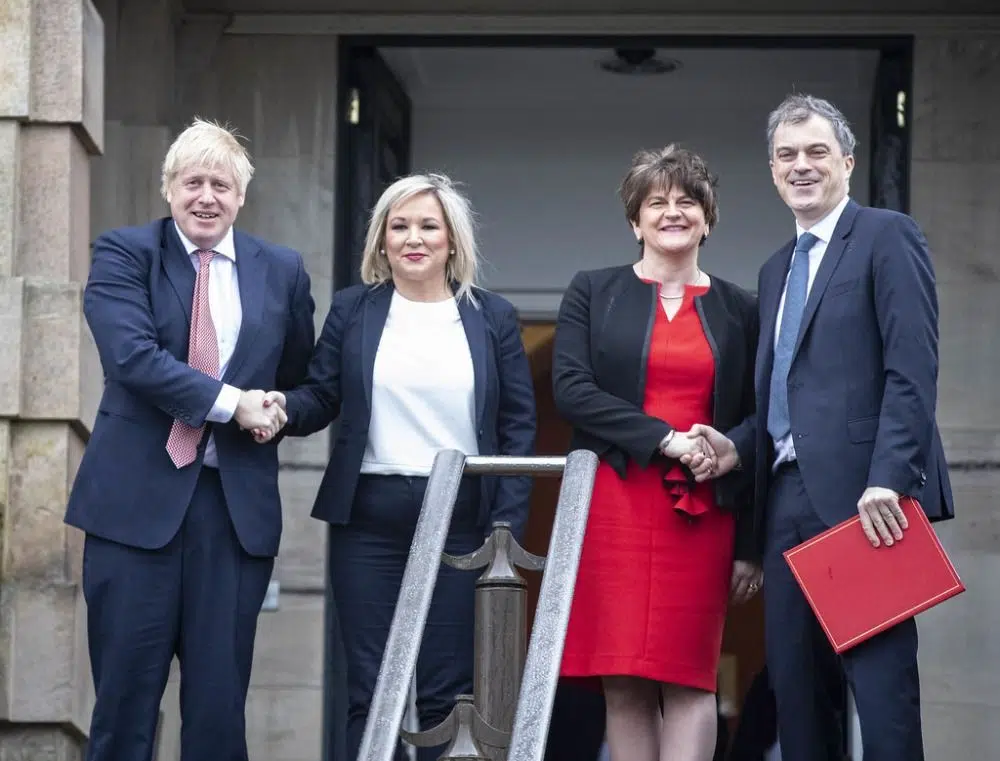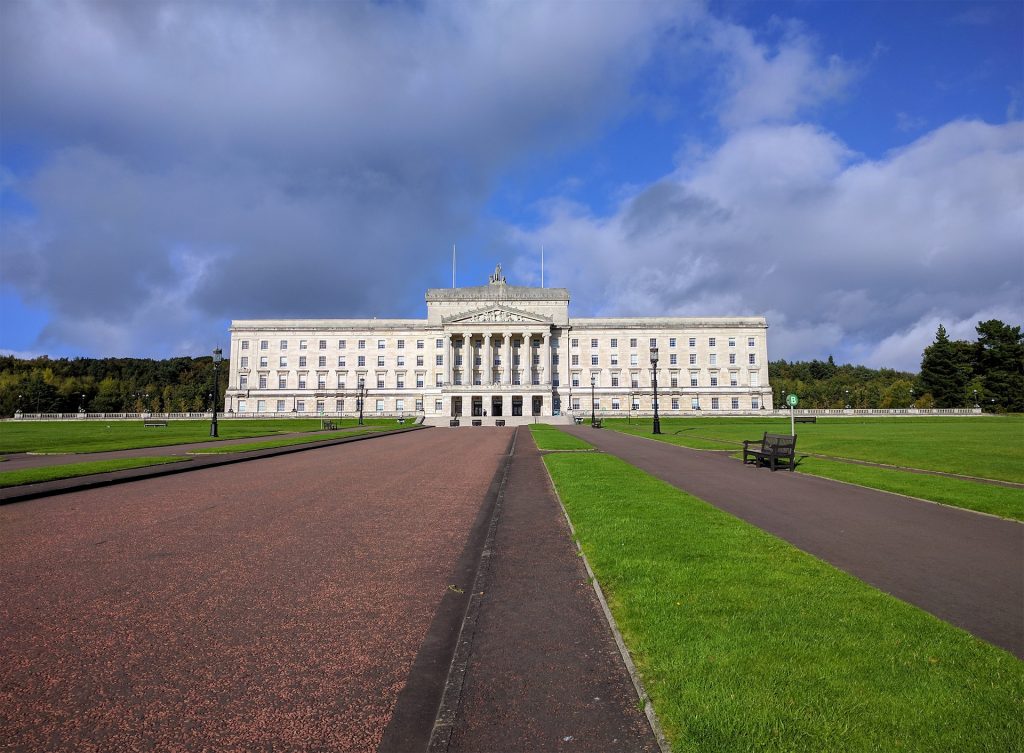Northern Ireland is a country home to around 1.8 million people, located in the northeast of the island of Ireland.
Northern Ireland is described in different ways, but usually as a country or region that is part of the United Kingdom. The country shares a border with the Republic of Ireland.
Northern Ireland was created back in 1921 when Ireland was partitioned between Northern and Southern Ireland. The majority of Northern Ireland’s population were ‘unionists’ – people who wanted to remain within the United Kingdom. However, a significant number were ‘nationalists’, wishing for the reunification of Ireland and independence from Britain. Unionists tended to be Protestant and nationalists tended to be Catholics – politics in Northern Ireland is still largely centred around religion today.
Politics in Northern Ireland is complex and has a complicated history. Click through the tabs below to learn more about how politics works in Northern Ireland both today and historically.

The people of Northern Ireland are represented in multiple ways. Some of the main ways are as follows.
UK Parliament
Of the 650 constituencies in the UK, 18 are in Northern Ireland. Much like the rest of the UK, members of the public who are registered to vote elect candidates to become MP for their areas at UK General Elections. At the last UK General Election, the Democratic Unionist Party (DUP) won 8 seats, Sinn Féin won 7 seats, the Social Democratic and Labour Party (SDLP) won 2 seats and the Alliance Party won 1 seat.
The elected MPs can sit in the House of Commons in Westminster, debate and vote on UK wide issues. Sinn Féin refuses to sit in the House of Commons of vote though, with the party refusing to recognise the UK Parliament as having any power over any part of Ireland. Sinn Féin is one of the nationalist parties (the largest Irish nationalist party) and thus supports Northern Ireland joining with Ireland and becoming independent of the United Kingdom.
Northern Ireland Assembly
The Northern Ireland Assembly is a unicameral legislative assembly. This means it can make laws and has only one chamber. The Assembly sits at Parliament Building at Stormont in Belfast and is often referred to as just ‘Stormont’.
Click the tab above to learn more about the Northern Ireland Assembly.
Local Government
Northern Ireland has 11 districts for local government purposes. Each area has a council, though they have limited responsibilities compared to councils elsewhere in the UK.
The councils do have some powers and functions, such as over local leisure and community services, planning and waste and recycling services. The districts in Northern Ireland are as follows;
- Antrim and Newtownabbey
- Ards and North Down
- Armagh City, Banbridge and Craigavon
- Belfast
- Causeway Coast and Glens
- Fermanagh and Omagh
- Lisburn and Castlereagh
- Mid and East Antrim
- Mid Ulster
- Newry, Mourne and Down
Councillors are elected to each Council for a four-year term. Most of the Councils have 40 councillors, though Newry, Mourne and Down and Armagh City, Banbridge and Craigavon have 41 councillors and Belfast has 60 councillors.
Secretary of State for Northern Ireland
The UK Government has a Northern Ireland Office, headed by the Northern Ireland Secretary. The current Secretary is Brandon Lewis.
The role of the Secretary has been reduced by the current devolution settlement. The role of the Secretary is now generally limited to representing Northern Ireland in the UK cabinet and overseeing the operation of the devolved administration.
The Northern Ireland Assembly has legislative (law-making) powers but is also responsible for electing the Northern Ireland Executive.
The Assembly has 90 seats in one chamber and also has 16 committees. Members of the Assembly are known as Members of the Legislative Assembly (MLAs) and are elected under a proportional representation system, usually every five years.
The Northern Ireland Assembly has the power to make laws in a range of areas, as granted to it by the Northern Ireland Act of 1998.
The Assembly has the power to pass laws in a range of devolved policy areas such as health and social services, education, agriculture, environmental issues, transport and economic development. These areas are known as ‘transferred’ policy areas and all matters are considered ‘transferred’ by default unless they are specifically ‘reserved’ or ‘expected’ matters.
There are some areas which the Assembly does not have the power to pass laws in. There are ‘reserved matters’, which are generally under the power of the UK Parliament, but the power may be delegated to the Northern Ireland Assembly on occasions or in the future. There are also ‘expected matters’, where only the UK Government and Parliament in Westminster have powers over them and the powers cannot be transferred to the Northern Ireland Assembly.
For example, the Northern Ireland Assembly, on its own, does not have the power to change the currency or change policy on national security
While the Northern Ireland Assembly can make laws in some areas, there are sometimes extra restrictions attached. For instance, some laws can only be passed in Northern Ireland if they have the support of a majority of both Unionists and Nationalists in the assembly. This is known as ‘cross-community support’, and if a group of at least 30 members of the Assembly have particular concerns about a proposed law, they can present a ‘petition of concern’, which usually leads to a ‘cross-community’ vote on the passage of the legislation.
The Government in Northern Ireland is known as the Northern Ireland Executive.
The Executive is made up of the First Minister, deputy First Minister and eight Ministers from different departments. The Executive exercises executive authority on behalf of the Northern Ireland Assembly and takes decisions on significant issues. It is also responsible for creating a programme for government and agreeing a budget for approval by the Northern Ireland Assembly.
In the UK cabinet, members of the Cabinet are chosen by the Prime Minister. However, in Northern Ireland, members of the Executive Committee are nominated by the political parties in the Northern Ireland Assembly, based upon each party’s share of seats in the Assembly. The Minister of Justice is nominated by the First and deputy First Minister and approved by a cross-community resolution of the Assembly.
Northern Ireland’s Executive is a power-sharing government and the First and Deputy First Minister act collectively. In technical terms, the government is an example of consociationalism – this is a form power-sharing for a state which has major internal divisions, such as on religion.
History of Northern Ireland Governments
- 1st Executive: July 1998 – October 2002
- 2nd Executive: May 2007 – May 2011
- 3rd Executive: May 2011 – May 2016
- 4th Executive: May 2016 – January 2017
- 5th Executive: January 2020 – Present
Devolved power has been revoked by the Secretary of State for Northern Ireland on multiple occasions. Between 2002 and 2007, there was no Government in Northern Ireland. Devolution was suspended due to the ‘Stormontgate’ controversy regarding an alleged Provisional Irish Republican Army spy ring based in Stormont. The suspension of devolved powers was ended in 2007.
Between January 2017 and January 2020, there was also no Government in Northern Ireland. Following long, extended and intensive talks, an agreement was published in early January 2020 and led to the formation of the 5th Executive. Click here to find out why Northern Ireland had no government for over 1000 days.
In 1998, the Good Friday Agreement (also known as the Belfast Agreement) won 71% approval in a public vote, leading to devolution to Northern Ireland. The Good Friday Agreement helped lead to the creation and shaping of the institutions now governing Northern Ireland, as did the theory of consociationalism – a type of democracy. There are four key characteristics of this type of democracy that are present in Northern Ireland.
- Grand Coalition – There is a coalition consisting of multiple parties, rather than just two. The First Minister and Deputy First Minister also have equal powers.
- Mutual Veto – This helps to ensure equality between the minority and majority groups. The Northern Ireland Assembly has the ‘petition of concern’ system (as described under the Northern Ireland Assembly tab).
- Proportionality – A form of Proportional Representation is used to help ensure equal representation and that ministerial positions are granted relative to how well a party does in an election.
- Segmental Autonomy – This creates a sense of individuality and is used to allow for different community laws, primarily on cultural issues.
Prior to the Good Friday Agreement in 1998 and from the late 1960s, Northern Ireland had experienced a time of conflict known as ‘the Troubles’.
A key issue was the constitutional status of Northern Ireland.
- Unionists, mainly Ulster protestants, wanted Northern Ireland to remain in the United Kingdom.
- Nationalists, mainly Irish Catholics, wanted Northern Ireland to split ties with the United Kingdom and join a United Ireland.
During the conflict, around 3,532 people are thought to have died, while over 47,500 are thought to have been injured. The conflict mainly took place in Northern Ireland but also took place in parts of Ireland and mainland Europe.
While the Troubles are recorded to have ended with the Good Friday Agreement, there are still significant religious divides in parts of Northern Ireland to this day.



